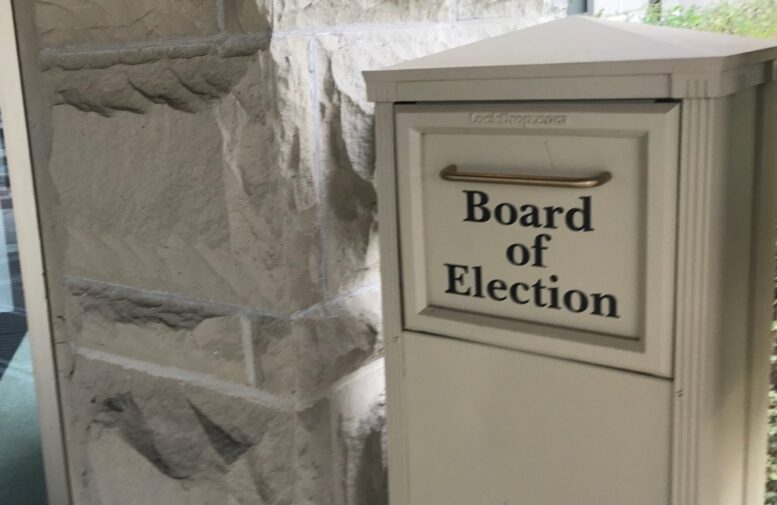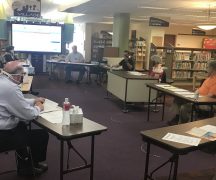Ohio elections officials are urging voters to take advantage of absentee voting this fall, noting it is a safe option amid the coronavirus pandemic.
President Donald Trump has repeatedly spread misinformation about the practice of voting by mail, and this week has encouraged voters to potentially cast multiple ballots — an illegal practice that is a fourth-degree felony in Ohio.
There are measures in place to ensure all eligible votes are properly counted and Ohio Secretary of State Frank LaRose has defended the integrity of the absentee voting system this year.
To vote absentee, citizens must first submit an application form. All registered voters are being mailed a blank application form to fill out; people have begun receiving them this week.
Many voters have already sent in their absentee ballot requests — if so, that means they can disregard the extra form sent by the state.
Absentee voters should expect to receive their blank ballot in early October. As long as their ballot is postmarked by Nov. 2 (the day before the election), their vote will be counted. These ballots can also be taken to a drop box located at the voter’s county board of elections office.
Trump has attempted to sow unfounded doubt about the absentee voting process. In a string of tweets on Thursday morning, he encouraged Americans voting by mail to still visit their polling place on Election Day to double check their ballot has been “tabulated.” Trump suggested they could cast a second ballot in person to be assured their vote has been counted.
That is not how the election system works. The Ohio Secretary of State office is discouraging the voting practice Trump is promoting.

from Thursday were flagged
by Twitter for “encouraging
people to potentially vote twice.”
“Ohio voters are encouraged to choose one way to vote, as any additional effort to cast a ballot will not be counted and unnecessarily burdens election officials,” said Maggie Sheehan, a spokesperson for the secretary of state.
Absentee voters do not need to visit a polling place to check their mail-in ballot’s status. They can do so this fall online at voteohio.gov/track. When the time comes, this online check will show the date a ballot was received by the voter’s board of elections office. It also shows the date this ballot was “accepted for counting.” (If it isn’t accepted, the tracker will list the reason why, and provide the voter information about how they can correct the issue.)
If such a voter did visit their polling place, they would be identified on the “pollbook” as having already requested an absentee ballot, Sheehan said. Any person that has requested an absentee ballot that tries to vote in person would cast a provisional ballot.
Provisional ballots are those cast when a voter’s eligibility is in question and are subject to further review from elections officials. One reason for this is to prevent the situation Trump is referencing — keeping an absentee voter from having two separate votes counted in the election.
‘(T)here are redundancies in place to ensure only one vote will count per individual,” Sheehan said.
Trump is also wrong in suggesting a poll worker would be able to confirm an absentee vote has been “tabulated” or “counted.” Votes of any method aren’t counted until the polls close on election night. As mentioned, the online ballot check does however tell you if it has been approved to be counted.
According to the Ohio Revised Code, attempting to vote more than once in the same election (for example, by absentee and in person) is a fourth-degree felony.
Information for voters
Citizens still have ample time to register to vote; request an absentee ballot; and prepare for the 2020 General Election.
The voter registration deadline is Monday, Oct. 5. That is also the same deadline for registered voters to update their registration (such as an address change) ahead of the November election.
Registered voters can request an absentee ballot all the way up to Saturday, Oct. 31, though LaRose is encouraging voters to get their request forms in well before that. All registered voters will have a request form mailed to them soon — if they haven’t received it already — and they can be mailed back to the voter’s board of elections office or returned to the office’s dropbox.
Besides voting by mail, Ohioans can also vote early in-person at their board of elections office. That opportunity will begin on Oct. 6; a full calendar is available here.
Poll workers still needed
Ohio is still in desperate need of poll workers for the November election.
LaRose is promoting a number of recruitment drives:
- Youth at the Booth: Ohioans as young as 17 years old can serve as poll workers. LaRose is encouraging eligible teenagers to consider signing up.
- Second Call to Duty: The state is encouraging service members and veterans to “defend democracy” by becoming a poll worker.
- Give a Day For Democracy: LaRose is encouraging Ohio employers to give their employees the day off Nov. 3 in order for them to serve as poll workers.
- Work a Day and Donate Your Pay: Employees and volunteers of nonprofits could work the polls and donate their day’s pay to their respective organizations.
- Continuing Education: Ohio lawyers and certified public accountants (CPAs) can receive continuing education credits from their professional licensure entities by serving as poll workers.
Per LaRose, the state has 33,577 Ohioans who have committed to being poll workers this November. The minimum number statewide that is needed is a little over 37,000, but LaRose has set a much higher goal of 55,588 to work the polls.
Prepping a safe Election Day
LaRose has presided over a “Ready For November” task force that has met digitally to prepare for a safe Election Day conducted amid the pandemic. Members include other elections officials throughout the state.
The group’s latest meeting featured perhaps an unexpected guest for an elections discussion: Jason McClure, the vice president and general manager of Cedar Point amusement park. McClure was invited to describe the way his park has safely accommodated large crowds of people during its abbreviated 2020 season.
Polling places are used to heavy voter traffic for presidential elections, but “line management” will be even more important this year. LaRose said it will be necessary to keep voters socially distant and the group discussed ways this can be organized in November.
The lines may appear longer because voters are spread apart, the secretary said, but they will hopefully move quickly and voters shouldn’t be discouraged by seeing the lengthy line.
***
DeWine breaks from controversial CDC guidance on coronavirus testing
In a subtle yet key split from CDC guidance, Gov. Mike DeWine said Thursday that people who have been exposed to the coronavirus but are not showing symptoms should seek testing.
Last week, the CDC updated its COVID-19 testing guidance to say people who have had close contact with an infected person but are not showing symptoms “do not necessarily need a test” unless they’re vulnerable to the disease.
Prior CDC guidance said such people should get tested. Public health officials have blasted the CDC’s decision, describing it as politically motivated to benefit President Donald Trump. At a June campaign rally, Trump explicitly urged officials to “slow the testing down” to artificially decrease case counts.
“I would say they should get tested,” DeWine said when asked about people without symptoms who have been exposed to COVID-19. READ MORE
Education associations say teacher evaluations illogical in COVID-19 school year
Education officials say teachers need to be given a break from annual evaluations that could punish them for a year of COVID-19 uncertainty.
Current and former superintendents, along with representatives from teacher’s associations across the state said Wednesday that significant uncertainty still remains as schools go back to various learning modes, and the idea of also completing the usual yearly checkpoints shouldn’t be a focus for educators this school year.
“Step back and let school districts find out where are we, and where we need to go, without the threat of the performance of those students impacting them negatively moving forward,” said Kevin Miller, head of the Buckeye Association of School Administrators (BASA).
Education officials were at the Statehouse to speak in support of Senate Bill 358, bipartisan legislation introduced the same day to the Senate Education Committee. READ MORE





